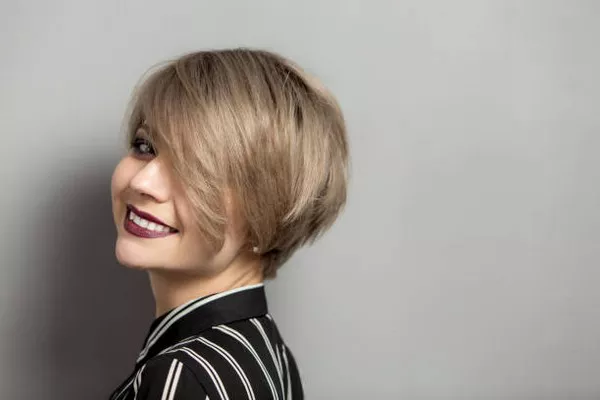Cutting side bangs can significantly alter your look and add a touch of sophistication or playfulness to your hairstyle. This guide provides detailed instructions and analysis on how to achieve the perfect side bangs, whether you’re a stylist or someone looking to do it yourself.
Understanding Side Bangs
Side bangs are a versatile and popular hairstyle choice that can frame the face, soften features, and complement various haircuts. They come in different styles, lengths, and shapes, depending on personal preference and face shape.
Types of Side Bangs
Soft Side Bangs: These are longer and blend seamlessly into the rest of the hair. They add a gentle frame to the face.
Blunt Side Bangs: These are cut straight across and can add a bold statement to your hairstyle.
Layered Side Bangs: These are cut in layers, creating a more textured and voluminous look.
Wispy Side Bangs: These are light and airy, often cut with texturizing shears for a softer appearance.
Tools Needed
Before you start cutting side bangs, ensure you have the following tools:
Sharp Hair Cutting Scissors: For precise cutting.
Comb: To detangle and section the hair.
Hair Clips: To keep hair sections separate.
Mirror: To see the back and sides of your hair.
Hair Cutting Shears: For a more controlled cut.
Preparing to Cut Side Bangs
Step 1: Determine the Desired Length and Style
Decide how long you want your side bangs to be and what style suits your face shape. It’s essential to consider these factors before cutting to avoid any regrets.
Step 2: Wash and Dry Your Hair
Wash your hair to remove any product buildup and dry it thoroughly. Cutting hair that is damp can lead to uneven results because hair shrinks as it dries.
Step 3: Section Your Hair
Use a comb to create a section for your bangs. Part your hair where you want the bangs to start. Secure the rest of your hair with clips to keep it out of the way.
Cutting Techniques
Basic Cutting Method
Comb the Hair: Use a comb to smooth out the hair section you want to cut.
Decide on the Length: Hold the hair between your fingers at the desired length.
Cut with Precision: Use sharp scissors to cut the hair. Cut small sections at a time to avoid mistakes.
Cutting Soft Side Bangs
Create a Side Part: Part your hair to one side, determining where the bangs will fall.
Cut at an Angle: Hold the hair at an angle and cut to create a softer look.
Texturize the Ends: Use texturizing shears to make the ends appear softer and more natural.
Cutting Blunt Side Bangs
Measure the Length: Decide how short you want your blunt bangs.
Cut Straight Across: Use sharp scissors to cut the bangs straight across. Be precise to avoid unevenness.
Cutting Layered Side Bangs
Section the Hair: Create layers by cutting different sections at varying lengths.
Cut Gradually: Start with longer layers and gradually cut shorter for a layered effect.
Blend the Layers: Use thinning shears to blend the layers seamlessly.
Cutting Wispy Side Bangs
Texturize the Hair: Use texturizing shears to cut small amounts of hair at a time.
Cut in Small Sections: Work in small sections to ensure a wispy, airy look.
Avoid Cutting Too Much: Wispy bangs should be light and not too dense.
See Also: How Do You Style A Wavy Bob
Common Mistakes and How to Avoid Them
Cutting Too Short
Always cut less than you think you need. You can always trim more, but you can’t add length back.
Uneven Cutting
Ensure to cut evenly by checking the length from different angles. Use a mirror to check the back and sides.
Over-Thinning
Be cautious with texturizing shears. Over-thinning can lead to uneven and frizzy bangs.
Post-Cutting Care
Styling Your Side Bangs
Use a round brush and a blow dryer to style your bangs. This helps in creating volume and shape.
Regular Trims
Side bangs require regular trims to maintain their shape and prevent them from becoming too long or uneven.
Using Hair Products
Apply lightweight styling products to keep your bangs in place without making them greasy or stiff.
Tailoring Side Bangs to Face Shapes
Oval Face
Side bangs can add dimension and frame your face. Opt for soft, layered bangs that blend with your hair.
Round Face
Choose longer side bangs that cover part of your forehead to elongate the appearance of your face.
Square Face
Side bangs with some volume can soften the angles of your face. Wispy or layered bangs work well.
Heart-Shaped Face
Opt for side bangs that are fuller and start lower on the forehead. This balances the narrow chin and wider forehead.
Conclusion
Cutting side bangs can be a rewarding way to change up your hairstyle. By understanding the different styles, using the right tools, and following precise techniques, you can achieve a professional look at home. Regular maintenance and styling will ensure your side bangs remain a stylish and flattering feature of your hairstyle.


